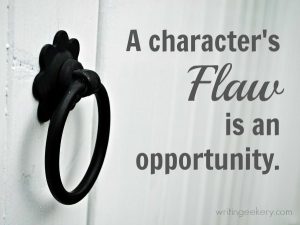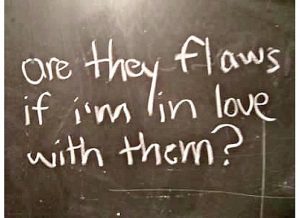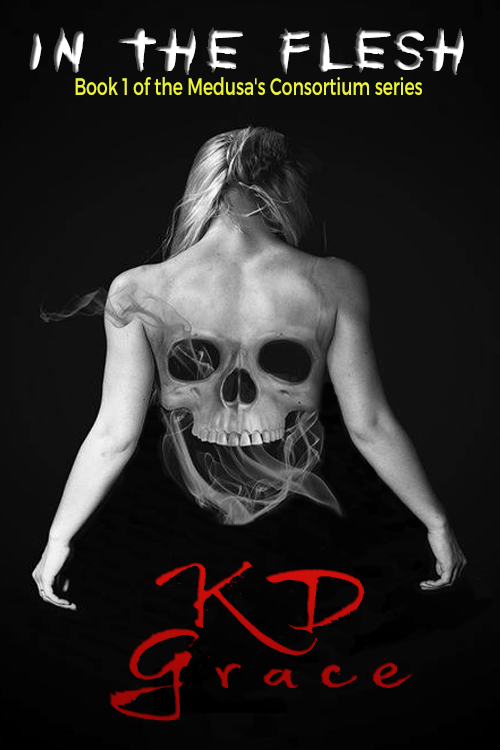(from the archives)

I’m thinking about flaws today, which is not unusual, since I’m smack-dab in the middle of the final rewrites of Blind-
Sided and In The Flesh. In one, the main character lives with a demon 24/7, in the other, the hero is homeless and living in the storm tunnels of Vega. Both novels are filled with the most deliciously neurotic group of characters I’ve ever had the pleasure of working with – father issues, inferiority complexes, jealousy, obsessions with work, obsessions with revenge. Oh my! I’m excited just thinking about them. I’m thinking about flaws rather than nice arses or the size of the package or the pertness of the tits, because the more I uncover of my characters’ flaws, the better I like them. The more I uncover my characters’ flaws, the better I know them – the better my readers will know them.
I’m not saying that I don’t want a strong hero, or a heroine who is bad-ass. Of course I do. I want strong, sexy, intelligent. I want it all! But I’m saying that there’s something about the stuff that both the hero and the heroine keep hidden, the stuff that they don’t really want me, or my readers, to see that makes me want to embrace them and love them, that makes me remember them long after the novel is over.
I suppose it’s the need to identify as much as anything. I mean, lets face it, we all put ourselves in the story as we read it. We all become in some way, the characters we read about. And if we do it as readers, I promise that we writers do it even more. Living vicariously is the name of the game for us, whether we’re reading or whether we’re writing. That means that I need to be able to identify with those characters and, to be honest, perfection is not very relatable.
Of course we want our heroes to be larger than life, to live beyond what our everyday work-a-day world offers, to have adventures and mad, passionate, filthy sex, and in the end to win the day and get the love they deserve. I’m speaking of romance here, of course, because that’s what I write. I need to have romance in any story I’m writing because I’m a romantic to the core and I need to believe that love will prevail.
But I also need to believe that love will prevail in spite of our flaws, that it isn’t our beauty that makes us loveable, but something much deeper, something that struggling to live with those flaws creates – the oyster making the irritating grain of sand into a pearl, if you will. The flaws in characters are a touchstone to their humanity and to their relatability as well as an opportunity for them to do battle with themselves, an opportunity to overcome. Those flaws are also the opportunity to answer the big question in all romance – is the hero worthy of unconditional love, and can the heroine give it to him and facilitate either the healing he needs or the acceptance he needs to come to grips with those flaws and except them as a part of who he or she is, to live large in spite of those flaws.
Flaws make stories multi-dimensional in a way an external battle alone never can. Granted, an external battle is a fantastic way to bring character flaws to the surface, and Susan and Reese, and Samantha and Jon have mind-blowing external battles to deal with, but in a story or in real life, it’s how those flaws are dealt with in the external battles that keep readers (and writers) on the edge of their seats and reading or writing until the transformation happens. And  sometimes the transformation is simply the acceptance of self. In fact more often than not, the internal battles are characters’ struggle to move beyond denial and accept who they are. Often that involves coming to the understanding that someone else, someone they have come to care about, has also accepted them and values them for who they are.
sometimes the transformation is simply the acceptance of self. In fact more often than not, the internal battles are characters’ struggle to move beyond denial and accept who they are. Often that involves coming to the understanding that someone else, someone they have come to care about, has also accepted them and values them for who they are.
Here’s a little scene from In The Flesh, book 1 of the Medusa’s Consortium series. in which Susan discovers that some of Michael’s flaws are real doozies. Enjoy.
When Susan Innes comes to visit her friend, Annie Rivers, in Chapel House, the deconsecrated church that Annie is
renovating into a home, she discovers her outgoing friend changed, reclusive, secretive, and completely enthralled by a mysterious lover, whose presence is always felt, but never seen, a lover whom she claims is god. As her holiday turns into a nightmare, Susan must come to grips with the fact that her friend’s lover is neither imaginary nor is he human, and even worse, he’s turned his wandering eye on Susan, and he won’t be denied his prize. If Susan is to fight an inhuman stalker intent on having her as his own, she’ll need a little inhuman help.
“You’re an angel. The sculpture in the garden at Chapel House, it’s you, isn’t it?” The fact that the question sounded totally insane seemed irrelevant considering the way the weekend had gone so far.
He shrugged and I watched as a blush climbed his throat spread across the tightening of his jaw and up his cheeks. “I’m retired,” he replied without looking at me. Then he added quickly, “The sculpture’s old. A friend of mine did it a long time ago, taking the piss really — especially by putting it there in that particular garden.” He ran a large hand through the fall of damp hair. “It’s her way of reminding me that I’m grounded now, tied to the earth just like every other mortal. No matter what I was, at the end of the day, I’m dust, and I’ll return to dust, if I’m lucky.”
“Wait a minute, angels can retire?’
He shot me a quick glance. “Well, it’s all a matter of semantics, isn’t it?”
“Then you’re not a builder?”
“Oh I’m a builder alright, and a damn good one,’ then he added as an afterthought, “Jesus was a carpenter, after all.”
I squinted hard in the fading light studying the lines of his face, the plane and slope of his strong upper body, the slow, deep rise and fall of his chest as he took in and released each breath. But I could find no distinction, nothing that would give away the fact that he was an angel and not an ordinary man. Oh he was nice to look at, he was interesting to look at, but he wasn’t beautiful, as I thought an angel would be. Obviously the nose had been broken since the sculpture was made, and he seemed thicker through the shoulders and chest. Perhaps that was all down to hard physical labor in lieu of playing a harp and mooching his way around the pearly gates. There were several white puckered scars just below his ribs. Two looked to be puncture wounds of some kind. The other was an angry gash that surely must have all but eviscerated him. Without thinking I reached out and traced the long pale arc of scar tissue that followed the shape of his lower left rib and disappeared in the shadow under his arm. He tensed beneath my touch and the skin along the path of my finger goose fleshed. “I had to force the issue of my retirement.” His words were barely more than a whisper, and his gaze was locked on the logs in the fireplace, laid, yet unlit.
“Christ,” I whispered. “Why? I mean why the hell would you give up immortality to be one of us?’
He covered my hand with his and held it against his side. At last he raised his gaze to meet mine. “I would have done anything to get away, and at that point, I didn’t care if I lived or died. It felt like it was all the same.”
“Are you a fallen angel then?”
This time he laughed out loud. “Stupid term, fallen angel. Truth be told, gods are bastards – all of them, any religion, any mythology, they’re all arrogant, megalomaniacal bastards. They want control, and when they don’t get it, well, they’re even worse bastards. The woman who made the sculpture, she knows that at least as well as I do.”
“Is she an angel too?”
He shook his head and looked away again, the smile slipping slightly from his face. “No angel, a pawn really. At least she started out that way.” His eyes flashed bright in the fading light and the smile returned. “But sometimes even the pawns thumb their noses at the gods and get away with it. It cost her. It cost her dearly, but no one controls her now.”
“So what, she was a sculptor, and the gods didn’t like her work, was that it?”
He released my hand and knelt to light the fire. With the sun setting the chill of evening came on fast. “Oh she’s not actually a sculptor. That’s just a part of her cover. She’s a thief, stealing back things the gods have taken that don’t belong to them.”
Every question he answered raised a dozen more. That what we were discussing sounded totally nuts wasn’t lost on me either, and yet neither was the fact that it was all either very real or I was still asleep dreaming in my bed, a cherished possibility diminishing with each passing moment. We both watched as the logs caught fire from the kindling, and flame blossomed turning shadows of ordinary things into ghouls and ghosts that writhed and dance on the walls. Once he was sure of the flame, he stood to close the balcony doors. “I work for her sometimes. When she needs me. She uses me when what I do as a builder dovetails with whatever job she’s on at the moment.”
the walls. Once he was sure of the flame, he stood to close the balcony doors. “I work for her sometimes. When she needs me. She uses me when what I do as a builder dovetails with whatever job she’s on at the moment.”
I shifted in my seat to look up at him as he returned to settle back on the chair arm. “So you’re trying to steal something from Chapel House? What is it, a flaming sword?”
He laughed. “Not anything that obvious. Chapel House and I have a long history, as you might have guessed from the sculpture.”
“Annie really did hire you to do the renovations at Chapel House?”
He nodded. “All a part of the plan.”
“It must have thrown a monkey wrench into your scheming when she fell in love with a demon, or whatever he
is, and told you to bugger off.”
He shrugged, raising one well-muscled shoulder. “Doesn’t matter. I seldom let something like that stop me.” He pulled a shirt from a peg next to the door and slipped into it. “I’ve brought your things in, and I would imagine you’d like a shower. Then we’ll see what we can scrounge for dinner. If that’s alright.”